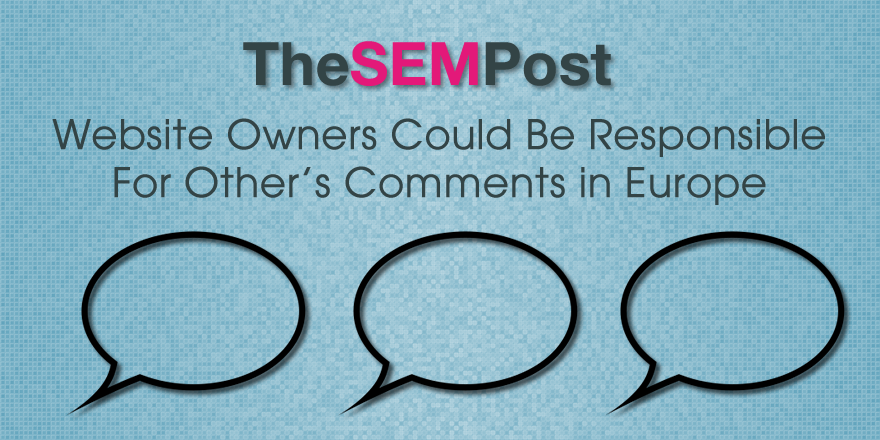 A new ruling in the European Court of Human Rights could have dire consequences for website owners. They found that website owners are responsible for comments made by others on their sites, even if they are removed from the site in question.
A new ruling in the European Court of Human Rights could have dire consequences for website owners. They found that website owners are responsible for comments made by others on their sites, even if they are removed from the site in question.
Techdirt has a detailed account of the ruling. The ruling itself can be found here.
The courts had issue with the fact that those who made comments couldn’t edit them once they were made – something that is common for nearly all news sites with comments enabled.
The site also had a comment policy in place to prevent “the posting of comments that were without substance and/or off-topic, were contrary to good practice, contained threats, insults, obscene expressions or vulgarities, or incited hostility, violence or illegal activities.” And incredibly, the courts had issue with that policy, stating it meant the site should have had better control over comments posted on their news stories.
The anonymity of comments made meant that instead of liability being found on those commenters, the website owner would instead be liable.
It is worth noting that the article in question was published back in January 2006 and automated automation methods have improved significantly since then. But this ruling making website owners liable for comments made by others could have a major impact on sites wanting to take on that liability by allowing comments at all and to shut down forums completely in self-censorship for fear of that liability.
One of the judges stated disallowing anonymous comments and only allowing comments from “verified users” would be the only way to place the liability on the commenter instead of the site owner. But the ability to verify someone’s identity would be problematic, and if a “verified user” turned out to be fake, then the liability would likely fall back onto the site owner.
This ruling could open the door to many others taking legal action against websites with comments that they see as inflammatory, and Techdirt notes it could have serious free speech implications in Europe.
It is quite likely, however, that many will seize upon this European Court of Human Rights ruling to go after many websites that allow comments and free expression in an attempt to block it. It is going to force many sites to either shut down open comments, curtail forums or moderate them much more seriously.
For a Europe that is supposedly trying to build up a bigger internet industry, this ruling is a complete disaster, considering just how much internet innovation is based on enabling and allowing free expression.
Ars Technica spoke with T J McIntyre, who is a lecturer in law and Chairman of Digital Rights Ireland, who explained where this ruling stands and how it affects site owners in Europe today.
Today’s decision doesn’t have any direct legal effect. It simply finds that Estonia’s laws on site liability aren’t incompatible with the ECHR. It doesn’t directly require any change in national or EU law. Indirectly, however, it may be influential in further development of the law in a way which undermines freedom of expression. As a decision of the Grand Chamber of the ECHR it will be given weight by other courts and by legislative bodies.
So it seems that it will not be used directly today, however it could be cited in future cases or in development for future laws.
Two judges wrote dissenting opinions on the ruling, bringing up the issue of self-censorship.
For the sake of preventing defamation of all kinds, and perhaps all “illegal” activities, all comments will have to be monitored from the moment they are posted. As a consequence, active intermediaries and blog operators will have considerable incentives to discontinue offering a comments feature, and the fear of liability may lead to additional self-censorship by operators. This is an invitation to self-censorship at its worst.
Jennifer Slegg
Latest posts by Jennifer Slegg (see all)
- 2022 Update for Google Quality Rater Guidelines – Big YMYL Updates - August 1, 2022
- Google Quality Rater Guidelines: The Low Quality 2021 Update - October 19, 2021
- Rethinking Affiliate Sites With Google’s Product Review Update - April 23, 2021
- New Google Quality Rater Guidelines, Update Adds Emphasis on Needs Met - October 16, 2020
- Google Updates Experiment Statistics for Quality Raters - October 6, 2020